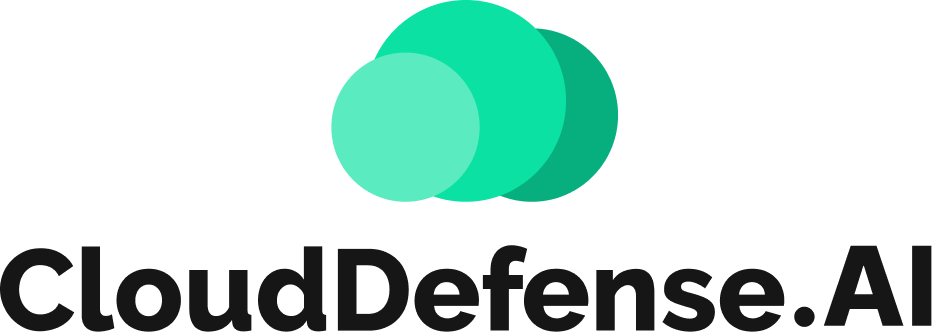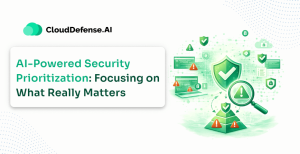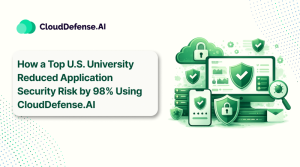Container orchestration platforms are getting a lot of buzz lately, especially with the growing trend of organizations adopting microservice architecture for their apps. In the sea of options out there, two platforms that catch the attention are Kubernetes and Nomad.
They both bring something unique to the table, making the decision-making process a bit tricky. But don’t worry. In this blog, we’re going to break down the comparison of Kubernetes vs Nomad to help you determine which one suits your needs and preferences best.
Understanding Kubernetes
What is Kubernetes?
Kubernetes is a smart open-source platform, often called K8s for short, which makes life easier when dealing with containerized applications. Imagine it as a developer-friendly tool that takes care of all the heavy lifting—deploying, scaling, and managing your apps—so you can just sit back and relax.
Google was the brain behind Kubernetes, but now it’s evolved and is in the capable hands of the Cloud Native Computing Foundation (CNCF). At its core, Kubernetes provides a container-centric infrastructure, allowing users to abstract the underlying infrastructure complexities and focus on deploying and managing applications consistently across diverse environments.
Key features of Kubernetes include automated load balancing, self-healing capabilities, and declarative configuration, enabling users to define their desired application state. Kubernetes comes with a treasure trove of plugins and tools that support various container runtimes, networking models, and storage options. This means you have the freedom to choose what suits your needs best. Whether you’re running a massive operation or dealing with critical applications, Kubernetes has your back. Its scalability and flexibility make it the go-to choice for big enterprises tackling complex missions.
Kubernetes Architecture
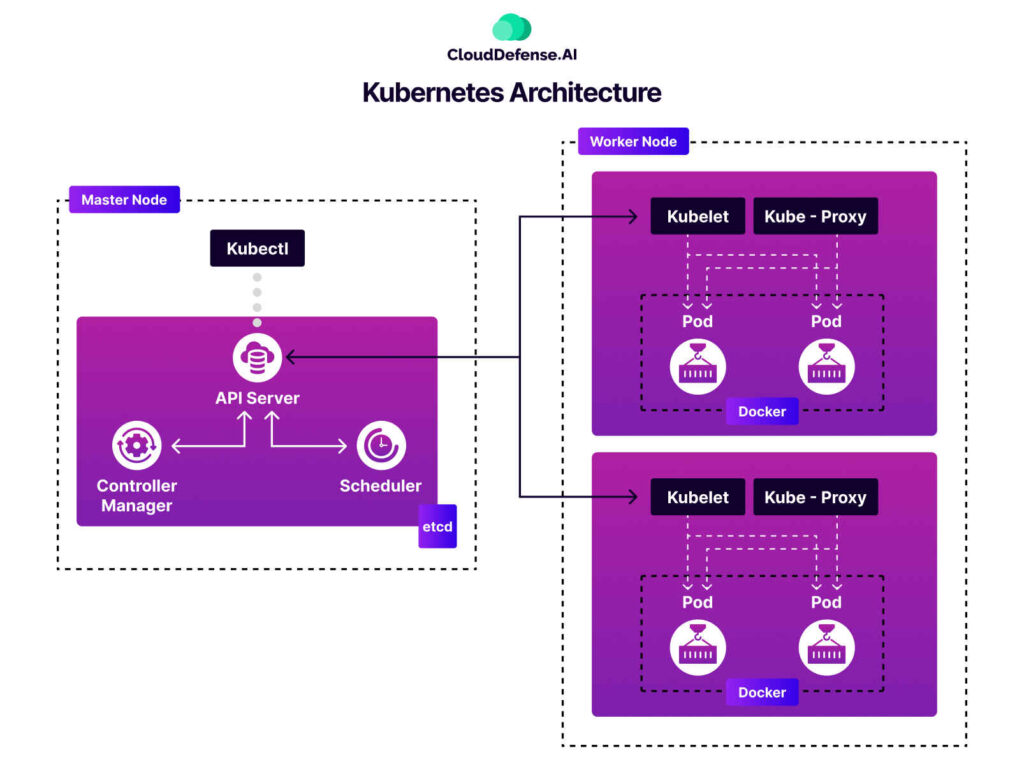
Kubernetes is built on a smart, distributed setup that effortlessly oversees containerized applications across a group of machines. Central to this setup is the control plane, the brains behind the operation. The key components within the control plane include:
- API Server—It acts as the entry point for the Kubernetes control plane, manages all external communication, and serves as the front end for the Kubernetes cluster.
- etcd—Then there’s etcd, your trusty data vault. It’s a distributed key-value store, keeping all the vital cluster config info safe and sound and ensuring everything stays consistent.
- Controller Manager—The Controller Manager acts as the guardian of your cluster. It keeps an eye on what’s happening and nudges things back on track if they go off course. Different controllers manage different aspects, like nodes, replication, and endpoints.
- Scheduler—This is all about efficiency, making sure workloads get assigned to the right nodes based on their needs and the rules of the game.
The worker nodes, where containers run, also play a crucial role:
- Kubelet: Ensures that containers are running in a Pod, a basic deployable unit in Kubernetes, and communicates with the control plane to report the node’s status.
- Container Runtime: The software responsible for running containers. Docker and containers are common container runtimes integrated with Kubernetes.
- Kube Proxy: Maintains network rules on nodes, enabling communication across the cluster and load balancing of traffic.
Understanding Nomad
What is Hashicorp Nomad?
HashiCorp Nomad is an open-source container orchestration and scheduling platform designed to simplify the deployment and management of applications at scale. It’s basically your go-to platform when you want to make deploying and managing applications on a larger scale super easy. The brains behind Nomad are the same folks who brought us other highly effective tools like Terraform and Vagrant—HashiCorp. The best part? Nomad keeps it simple.
While some alternatives out there can get a bit complicated, Nomad takes the minimalist route, making it a top pick for those who want a lightweight and straightforward solution. Nomad plays nice with various workloads—we’re talking containers, virtual machines, and standalone executables. It’s a versatile player that can handle all sorts of applications.
Nomad Architecture
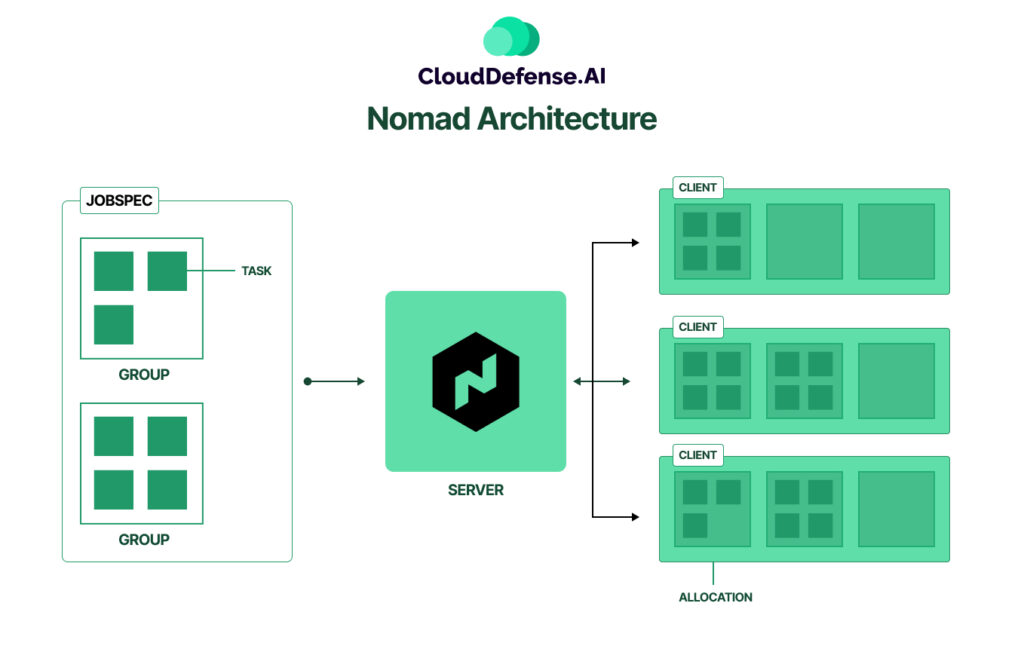
Nomad’s architecture centers around how its main building blocks—Agents, Clients, Servers, and the specialized Dev Agent—collaborate. These well-coordinated nomad enterprise features ensure smooth task scheduling, execution, and top-notch availability within a Nomad cluster.
1. Agent:
Server Mode: In server mode, the Nomad agent oversees the entire cluster, managing jobs, tasks, and client nodes.
Client Mode: When in Client Mode, the agent focuses on carrying out assigned tasks, also known as playing the role of a “node” when in agent mode.
2. Client:
Clients play a crucial role in carrying out tasks assigned by servers. They’re like diligent messengers who connect with servers and eagerly await their next job. Acting as both workers and communicators within the Nomad cluster, clients are essential for getting things done and keeping the system running smoothly.
3. Server:
Servers play a critical role in Nomad’s framework, managing jobs and clients. They monitor tasks, handle task allocations, and decide which client nodes should tackle specific tasks. Servers also duplicate data internally to ensure high availability and fault tolerance.
4. Dev Agent:
The Dev Agent is an exclusive agent configuration designed for convenience, particularly for operating a single-node Nomad cluster. It’s built to work seamlessly as both a server and a client, making the setup process a breeze for development or testing scenarios.
One notable feature is that the Dev Agent doesn’t store its cluster state on disk. This means you can start fresh each time without worrying about clearing disk-based data between runs, ensuring a clean and consistent beginning for your operations.
Kubernetes: Pros and Cons
Advantages of Kubernetes:
- Scalability: Kubernetes excels at scaling applications seamlessly. It can handle both horizontal and vertical scaling to accommodate varying workloads.
- Rich Ecosystem: With a vast and active community, Kubernetes has a rich ecosystem—tools, plugins, and extras that make it super versatile.
- Declarative Configuration: Kubernetes allows users to define the desired state of their applications, automating the process of maintaining and scaling that state.
- Community Support: Being a CNCF project, Kubernetes enjoys strong community support, leading to regular updates, bug fixes, and a wealth of documentation.
Disadvantages of Kubernetes:
- Complexity: The extensive feature set of Kubernetes can make it complex for beginners. Its multiple features can sometimes cause you to feel a bit lost.
- Resource Intensive: Kubernetes can be resource-intensive, both in terms of hardware requirements and the time and effort needed for maintenance.
- Networking Complexity: Configuring and managing networking in Kubernetes can be challenging, especially for users unfamiliar with container networking concepts.
Nomad: Pros and Cons
Advantages of Nomad:
- Simplicity: Nomad is known for keeping things simple. If you’re not into complications and prefer a straightforward container orchestration solution, it’s your go-to platform for running applications.
- Flexibility: Nomad supports a variety of workloads beyond containers, including virtual machines and standalone executables, providing flexibility for different application types.
- Scalability: Maybe not as feature-rich as Kubernetes, but Nomad knows how to handle both small and large-scale deployments.
- HashiCorp Ecosystem Integration: Nomad seamlessly integrates with other HashiCorp tools, such as Terraform and Consul, facilitating a unified infrastructure management approach.
Disadvantages of Nomad:
- Smaller Ecosystem: Nomad’s ecosystem, while growing, is not as extensive as Kubernetes. You might not find as many ready-made solutions or add-ons.
- Community Size: The Nomad community is smaller compared to Kubernetes, which may result in longer response times for support and fewer third-party resources.
- Learning Curve for HashiCorp Tools: Users unfamiliar with HashiCorp’s ecosystem may face a learning curve when integrating Nomad with other tools from the company.
Kubernetes vs Nomad: Differences between Kubernetes and Nomad
This table provides a short overview of key differences between Nomad and Kubernetes, aiding in the decision-making process based on your specific needs and preferences.
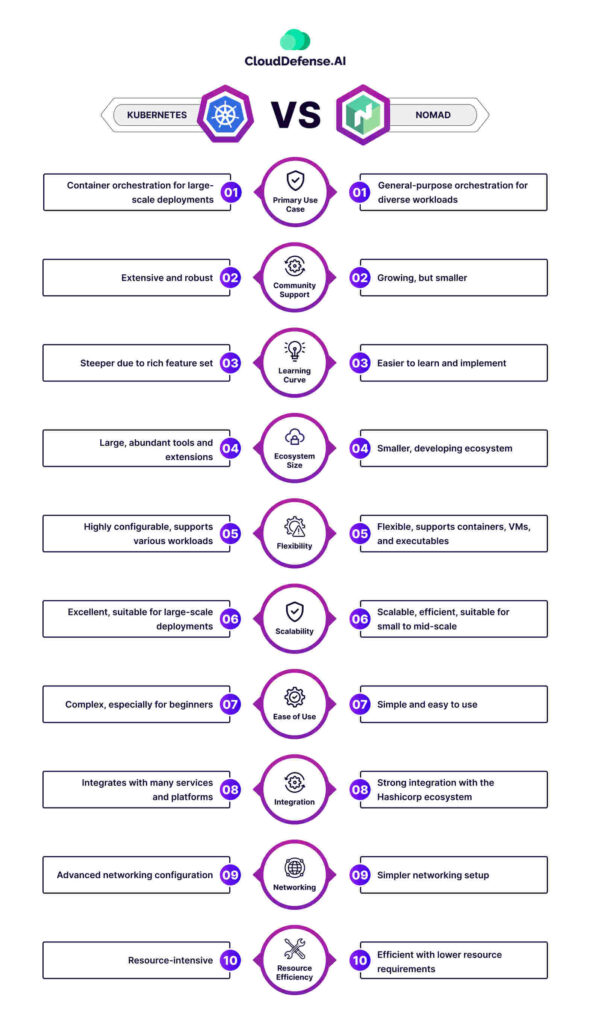
| Feature | Kubernetes | Nomad |
| Primary Use Case | Container orchestration for large-scale deployments | General-purpose orchestration for diverse workloads |
| Community Support | Extensive and robust | Growing, but smaller |
| Learning Curve | Steeper due to rich feature set | Easier to learn and implement |
| Ecosystem Size | Large, abundant tools and extensions | Smaller, developing ecosystem |
| Flexibility | Highly configurable, supports various workloads | Flexible, supports containers, VMs, and executables |
| Scalability | Excellent, suitable for large-scale deployments | Scalable, efficient, and suitable for small to mid-scale |
| Ease of Use | Complex, especially for beginners | Simple and easy to use |
| Integration | Integrates with many services and platforms | Strong integration with the Hashicorp ecosystem |
| Networking | Advanced networking configuration | Simpler networking setup |
| Resource Efficiency | Resource-intensive | Efficient with lower resource requirements |
Kubernetes vs Nomad: Which Should You Choose?
Selecting between Nomad vs Kubernetes involves weighing your specific needs against the strengths of each orchestration platform. Let’s break down the decision-making process.
Choose Kubernetes For:
- Scale and Complexity: Opt for Kubernetes if you’re dealing with large-scale, intricate applications requiring advanced orchestration features and scalability.
- Ecosystem Integration: Select Kubernetes if seamless integration with a diverse array of tools, plugins, and extensions is critical to your workflow.
- Community Support: If you value extensive community support, frequent updates, and a wealth of documentation, Kubernetes is the preferable choice.
- Investing in Learning: If you have the resources and time to navigate a steeper learning curve, especially to comprehend the complexities of a feature-rich orchestration system, Kubernetes is the way to go.
Choose Nomad For:
- Emphasis on Simplicity: Prioritize Nomad if you seek a lightweight and user-friendly orchestration platform, particularly suitable for smaller to mid-scale deployments.
- Flexible Workload Support: Opt for Nomad if your workloads span diverse types, including containers, virtual machines, and standalone executables, and you value a platform that accommodates this versatility.
- HashiCorp Ecosystem Alignment: If seamless integration with other HashiCorp tools like Terraform and Consul is a key element of your infrastructure management strategy, Nomad aligns well with your needs.
- Resource Efficiency: Nomad is the choice if you operate in an environment with resource constraints, as it offers efficiency without compromising scalability.
How Can CloudDefense.AI Secure the Container Orchestration Environments?
At Clouddefense.AI, we seamlessly integrate with both Kubernetes and Nomad, offering cutting-edge cloud security solutions that prioritize the nuances of your orchestration platforms. Our cloud security solutions are not an aftermath defense. We’re all about being proactive—continuously checking, assessing, and responding. Whether you’re using Kubernetes or Nomad, we’ve got your back, identifying vulnerabilities, monitoring for incidents, and making sure your setup is as tough as it gets.
We know that with the intricacies of Kubernetes and Nomad, human errors happen. Misconfigurations, overlooked patches, exposed data—we spot those vulnerabilities before they become a headache. From identifying misconfigured network policies to pinpointing unpatched cluster components, we provide a meticulous security net.
Furthermore, as the container often relies on diverse third-party configurations, our tool validates these, identifying security risks before they impact your production environment. Lastly, compliance is not just a checkbox; it’s a commitment. We monitor, alert, and enforce compliance, ensuring that your clusters meet the required security standards.
FAQs
1. Is Nomad better than Kubernetes?
Deciding between Nomad and Kubernetes depends on your specific needs. Nomad stands out for its simplicity and flexibility, which makes it ideal for straightforward container orchestration. Meanwhile, Kubernetes offers a more extensive feature set and has a larger community. Therefore, consider your team’s proficiency and project requirements to make an informed decision.
2. Who is using HashiCorp Nomad?
Various organizations leverage HashiCorp Nomad for their container orchestration needs. While specific users vary, Nomad is favored by those who appreciate its user-friendly nature and seamless integration with other HashiCorp tools like Terraform and Consul.
3. Does HashiCorp Nomad use multiple threads?
Nomad uses a scheduler that can take advantage of multiple threads to efficiently manage and allocate resources for running tasks. This capability contributes to Nomad’s scalability and performance in handling diverse workloads.
4. Does Nomad use Docker?
Indeed, Nomad is compatible with Docker containers. Its support extends beyond containers to include virtual machines and standalone executables, offering flexibility for different application types and deployment scenarios.
5. Why use Kubernetes over Nomad?
Opting for Kubernetes over Nomad is advantageous for projects requiring a robust feature set and benefiting from a thriving community. Kubernetes excels in seamless horizontal and vertical scaling and is endorsed by the CNCF. Consider Kubernetes if you seek comprehensive ecosystem support, declarative configuration, and a strong community foundation for your orchestration platform.
Conclusion
So, when choosing between Kubernetes vs Nomad, it all boils down to what suits your team and goals. Kubernetes is like the big player everyone knows, orchestrating most container setups out there. It’s got the numbers and a strong community backing it. On the other hand, Nomad, though not yet a close contender, emerges as a convincing solution with its simplicity and scalability, encapsulated in a single, portable binary agent.
Should you go with the Kubernetes or Nomad? Well, that depends on your style and needs. If you like the tried-and-true, go to Kubernetes. If you want something sleek and simple, Nomad might be your choice. The tech world is a wild ride, and who knows where these platforms will be in the future? Therefore, choose what fits you, and stay tuned for the tech saga ahead!
Curious about securing your containerized environments? Dive into our cutting-edge container vulnerability management solutions—book a live demo with CloudDefense.AI and strengthen your defenses against potential threats today.
